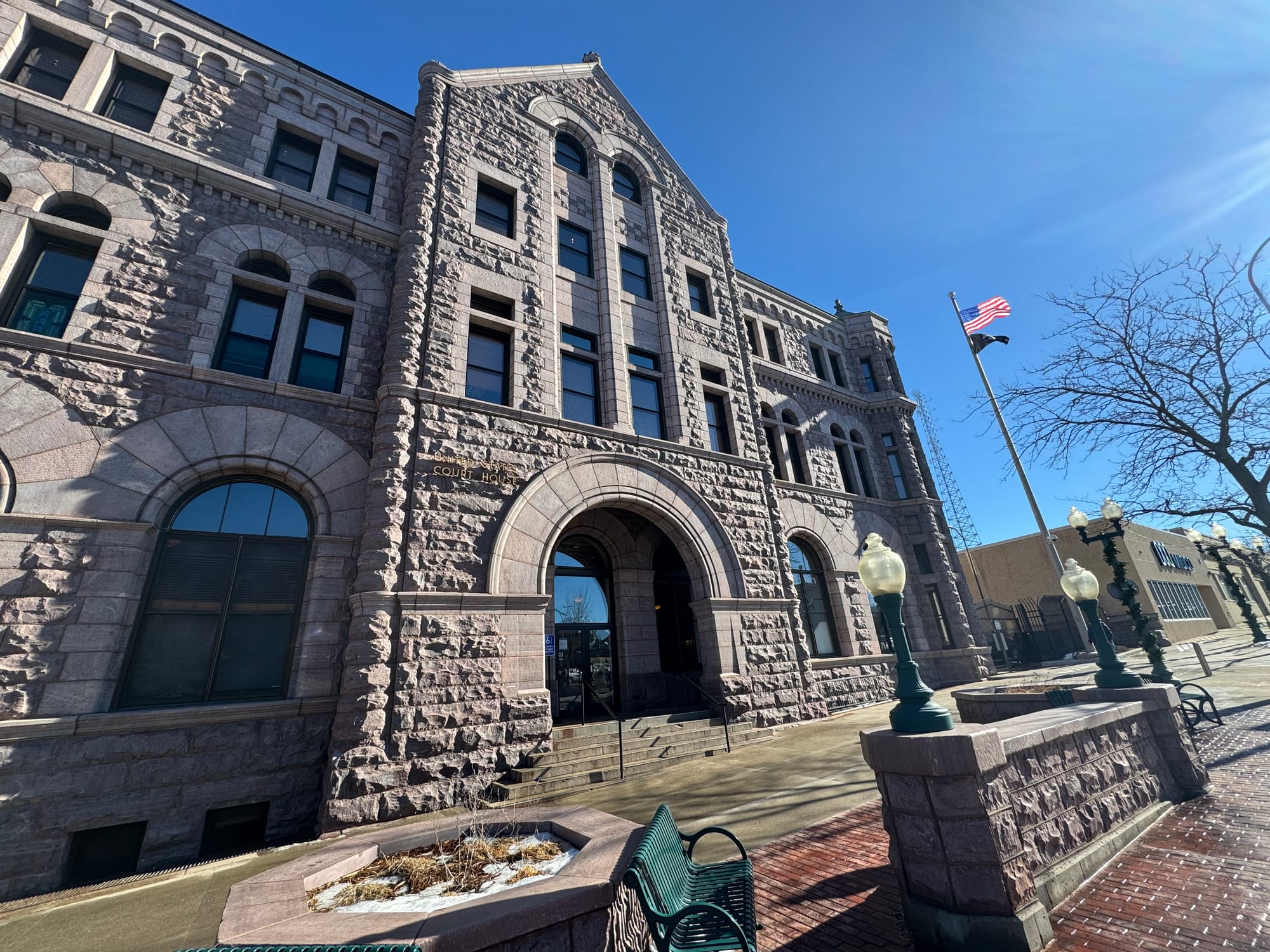SIOUX FALLS, S.D. – Camela Theeler and Eric Schulte each took an important step Thursday in their path to becoming federal district judges and giving South Dakota’s U.S. District Court full representation for the first time since 2021.
Theeler and Schulte passed through the Senate Judiciary Committee in Washington and were favorably reported to the full U.S. Senate, where a final confirmation vote is expected in the next few weeks.
“I think it will move fairly quickly,” Carl Tobias, a University of Richmond law professor who studies federal judicial nominations, told News Watch. “(Senate Majority Leader) Chuck Schumer and the Democrats have been happy to move red-state nominees that have the support of home-state senators, and that would be the case here.”
Theeler is a state circuit court judge who also worked in private practice with Lynn, Jackson, Schultz & Lebrun in Sioux Falls before being named assistant U.S. attorney in the civil division of the U.S. attorney's office in 2012.
Schulte, a litigation lawyer with Davenport Evans in Sioux Falls, is a former president of the State Bar of South Dakota whose legal work focuses on general civil litigation, insurance defense, and commercial and complex litigation.

Schulte passes with close margin
Though U.S. Sens. John Thune and Mike Rounds supported the nominations of Theeler and Schulte by President Joe Biden’s administration, there was a stark contrast in Thursday’s committee votes.
Theeler cruised through with approval of 20-1, with Missouri Sen. Josh Hawley – a consistent opponent of Biden nominees – offering the only rebuke.
Schulte’s vote was much closer, a 12-9 tally that included just one “yes” vote from a Republican in ranking member Sen. Lindsey Graham of South Carolina.
The GOP opposition was based on some of Schulte’s prior writings on the issue of “preclearance,” the process by which states and localities with a history of discriminatory voting practices are required to submit policy changes to the federal government for review.
Some of those provisions, which helped protect Native American voting rights as part of the Voting Rights Act, were curtailed by the U.S. Supreme Court in a 2013 ruling that Schulte had questions about in his writings.
Tobias called the vote “a little troubling” but stressed that emerging from the committee was the important thing for Schulte. He expects Schulte and Theeler to be confirmed by the Democratic-controlled Senate, where a simple majority vote is needed for the lifetime judicial appointment.
“I don’t think the (close committee vote) is going to make any difference,”
Tobias said. “They’re both on track, and I think you’ll see some bipartisan support.”

GOP senators part of process
The Schulte and Theeler federal candidacies came after months of negotiation between White House representatives and the offices of Thune and Rounds.
That arrangement reflected the political reality of appointing judges in a Republican-controlled state under a Democratic administration in a presidential election year.
“Eric Schulte and Camela Theeler are both well-qualified attorneys and highly respected within the South Dakota Bar Association and in their communities,” Thune and Rounds said in a joint statement to News Watch in February, when Schulte and Theeler were officially nominated. “Throughout our discussions with the White House, we stressed the importance of nominating candidates who would exercise judicial restraint and apply the law fairly.”
A sense of urgency has set in as Biden seeks to match or surpass the 234 judicial appointments notched during the term of former President Donald Trump. The timetable is accelerated by the fact that control of the White House and Senate could potentially change hands in November.

Bench vacancies date back to 2021
The timeline of judicial vacancies in South Dakota’s federal courts started when U.S. District Judge Jeffrey Viken of Rapid City announced his retirement in September 2021 but took senior status, a process by which judges assume a reduced workload and create a federal vacancy. He kept most of his criminal cases while his civil docket was distributed among other judges.
U.S. District Judge Karen Schreier of Sioux Falls announced in January 2023 that she plans to retire and take senior status upon the confirmation of her successor, which created the second vacancy.
Viken fully retired at the end of September 2023, meaning all Rapid City criminal cases fell to the other judges, creating the need for occasional help from out of state.
“We’re doing everything we can to keep up,” Chief U.S. District Judge Roberto Lange said in December.
South Dakota courts increasingly busy
South Dakota’s district has four divisions: southern in Sioux Falls, northern in Aberdeen, central in Pierre and western in Rapid City. The federal courts handled 931 criminal and civil cases combined in 2023, up from 822 the previous year.
Indian Country jurisdiction create a unique and busy docket, with the western division encompassing nearly 40% of South Dakota’s federal criminal cases filed in 2023.
Those criminal cases have been distributed among the district’s two active judges, Lange and Schreier, and two judges on senior status, U.S. District Judges Lawrence Piersol and Charles Kornmann.
Biden was tasked with filling judicial vacancies in a heavy Republican state that already has a stable of Democratic-chosen lifetime appointees from former Presidents Bill Clinton and Barack Obama.
Of the active judges, Schreier was appointed by Clinton and Lange by Obama. Kornmann and Piersol were appointed by Clinton.
Biden has a razor-thin Senate majority that made it necessary to consult with Thune and Rounds to identify agreeable candidates. Judicial nominations typically go through a Senate tradition known as the “blue slip,” which allows home-state senators to weigh in on whether the nominee should move forward.
Theeler appointed by Daugaard in 2018
Theeler, named South Dakota Young Lawyer of the Year in 2009, is surrounded by legal experience in her family. Her husband, Tyson Theeler, is a USD law school graduate and vice president in trust administration for First Premier Bank. Her father-in-law, Jack Theeler, is a longtime defense attorney in Mitchell who earned his law degree at USD and starred as a basketball player for the Coyotes, earning a spot in the South Dakota Sports Hall of Fame.
Camela Theeler, a Pierre native, was appointed in 2018 by former Gov. Dennis Daugaard to South Dakota’s Second Judicial Circuit, which serves Minnehaha and Lincoln counties.
From the perspective of the Biden administration, Schulte’s candidacy was aided by the fact that he worked to boost the number of Native American lawyers as president of the bar association. Schulte promoted recruitment events along with support for Native students such as financial assistance with law school entry.
He also has been active with nonprofit and social service efforts, serving on the board of directors for East River Legal Services and The Banquet.
"These are good choices for South Dakota and the effective administration of justice," said Sioux Falls lawyer and former U.S. Attorney Brendan Johnson, who served on a committee to identify candidates early in the process. "I applaud President Biden for these nominations."
This story was produced by South Dakota News Watch, a nonpartisan, nonprofit news organization. Read more in-depth stories at sdnewswatch.org and sign up for an email every few days to get stories as soon as they're published. Contact Stu Whitney at stu.whitney@sdnewswatch.org.






